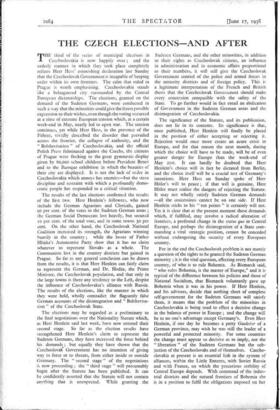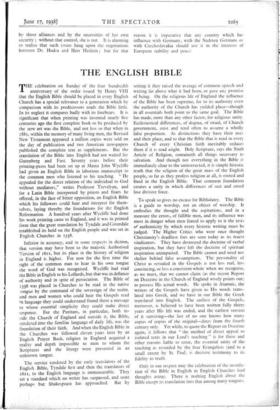THE CZECH ELECTIONS-AND AFTER
THE third of the series of municipal elections in Czechoslovakia is now happily over ; and the orderly manner in which they took place completely refutes Herr Hess' astonishing declaration last Sunday that the Czechoslovak Government is incapable of keeping order within its own frontiers. The calm that ruled in Prague is worth emphasising. Czechoslovakia stands like a beleaguered city surrounded by the Central European dictatorships. The elections, granted on the demand of the Sudeten Germans, were conducted in such a way that the minorities could give the freest possible expression to their wishes, even though the voting occurred at a time of extreme European tension which, at a certain week-end in May, nearly led to open war. The tension continues, yet while Herr Hess, in the presence of the Fiihrer, vividly described the disorder that prevailed across the frontier, the collapse of authority, and the " Bolshevisation " of Czechoslovakia, and the official Polish Press fulminated against the Czechs, the citizens of Prague were flocking to the great gymnastic display given by 6o,00o school children before President Beneg and to the Baroque exhibition in which the beauties of their city are displayed. It is not the lack of order in Czechoslovakia which annoys her enemies—but the stern discipline and restraint with which a profoundly demo- cratic people has responded to a critical situation.
The results of the last elections confirmed the results of the first two. Herr Henlein's followers, who now include the German Agrarians and Clericals, gained go per cent. of the votes in the Sudeten German areas ; the German Social Democrats lost heavily, but secured to per cent. of the total vote, and in some towns 3o per cent. On the other hand, the Czechoslovak National Coalition increased its strength, the Agrarians winning heavily in the country ; while the losses of Father Hlinka's Autonomist Party show that it has no claim whatever to represent Slovaks as a whole. The Communists lost in the country districts but gained in Prague. So far as any general conclusion can be drawn from the results, it is that Herr Henlein can fairly claim to represent the German, and Dr. Hodia, the Prime Minister, the Czechoslovak population, and that only in the large towns is there any tendency to the Left, despite the influence of Czechoslovakia's alliance with Russia. The results of the elections, like the manner in which they were held, wholly contradict the flagrantly false German accounts of the disintegration and " Bolshevisa- don " of the Czechoslovak State. - The elections may be regarded as a preliminary to the final negotiations over the Nationality Statute which, as Her Henlein said last week, have now entered their second stage. So far as the election results have strengthened Herr Henlein's claim to represent the Sudeten Germans, they have increased the force behind his demands ; but equally they have shown that the Czechoslovak Government has no intention of giving way to force or to threats, from either inside or outside Germany. The " second stage " of the negotiations is now proceeding ; the " third stage " will presumably begin after the Statute has been published. It can be confidently asserted that the Statute will not contain anything that is unexpected. While granting _ the Sudeten Germans, and the other minorities, in addition to their rights as Czechoslovak citizens, an influence in administration and in economic affairs proportional to their numbers, it will still give the Czechoslovak Government control of the police and armed forces in the minority districts and of foreign policy. This is a legitimate interpretation of the French and British thesis that the 'Czechoslovak Government should make every concession compatible with the safety of the State. To go further would in fact entail an abdication of Government in the Sudeten German areas and the disintegration of Czechoslovakia.
The significance of the Statute, and its publication, does not lie in its contents. Its significance is that, once published, Herr Henlein will finally be placed in the position of either accepting or rejecting it. Rejection would once more create an acute crisis in Europe, and for that reason the next month, during which the choice will have to be made, will be of even greater danger for Europe than the week-end of May 21st. It can hardly be doubted that Herr Henlein's choice will in fact be dictated from Berlin, and the choice itself will be a crucial test of Germany's intentions. Her Hess on Sunday spoke of Herr Hitler's will to peace ; if that will is genuine, Herr Hitler must realise the dangers of rejecting the Statute. It may not wholly satisfy Sudeten German demands —all the concessions cannct be on one side. If Herr Henlein sticks to his " ten points " it certainly will not. Yet it is clear that at the present moment these demands which, if fulfilled, may involve a radical alteration of frontiers, a profound change in the status quo in Central Europe, and perhaps the disintegration of a State com- manding a vital strategic position, cannot be conceded without endangering the security of every European country.
For in the end the Czechoslovak problem is not merely a question of the rights to be granted the Sudeten Gentian minority ; it is the vital question, affecting every European country, of who is to rule Bohemia. As Bismarck said, " who rules Bohemia, is the master of-Europe," and it is typical of the difference between his policies and those of National Socialism, that Bismarck voluntarily gave up Bohemia when it was in his power. If Herr Henlein, and his advisers, decide that nothing short of complete self-government for the Sudeten Germans will satisfy them, it means that the problem of the minorities in Czechoslovakia is being used to effect a decisive change in the balance of power in Europe ; and the change will be to no one's advantage except Germany's. Even Herr Henlein, if one day he becomes a petty Gauleiter of a German province, may wish he was still the leader of a powerful and protected minority. For some countries the Change must appear so decisive as to imply, not the " liberation " of the Sudeten Germans but the sub- jection of the Czechoslovaks and of themselves. Czecho- slovakia at present is an essential link in the system of alliances, within the Little Entente, with Soviet Russia and with France, on which the precarious stability of Central Europe depends. With command of the indus- trial districts and the natural frontiers of Bohemia she is in a position to fulfil the obligations imposed on her by those alliances and by the necessities of her own security ; without that control, she is not. It is alarming to realise that such issues hang upon the negotiations between Dr. Hodia and Herr Henlein ; but for that reason it is imperative that any country which has influence with Germany, with the Sudeten Germans or with Czechoslovakia should use it in the interests of European stability and peace.



















































 Previous page
Previous page